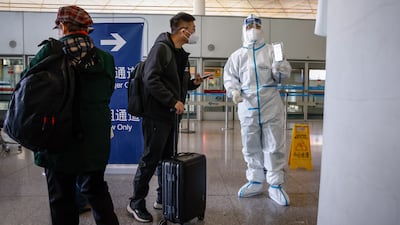Beijing's international airports have dropped the requirement for a negative Covid-19 test result to enter their terminals.
As China warily eases some coronavirus restrictions, state-run news outlets on Tuesday reported that Beijing Capital International Airport and Daxing Airport had dropped the Covid entry rule.
The Chinese authorities have announced changes to its stringent Covid policies after rare protests erupted in late November, fuelled by Beijing's zealous anti-virus measures.
Xinhua has reported that negative test results are also no longer required to enter supermarkets and offices in the capital.
Evidence of a negative nucleic acid test within the previous 48 hours is still required for entry to internet cafes, gyms, schools and nursing homes, among other places.
China is the world's largest major economy to continue enforcing strict rules to curb the spread of the virus, enforcing lengthy lockdowns and mass testing over relatively few cases.
Tens of millions have endured some form of lockdown in recent months, prompting anti-government demonstrations in Beijing, Shanghai and other cities across the country.
China has remained closed to international visitors for the past three years, while many inside the country have sought to leave amid President Xi Jinping's commitment to his party's "zero Covid" policy.
Officials downplayed the severity of the measures after the protests and said the Omicron variant of the coronavirus has weakened, leading to a relaxing of rules in several local authorities.
The country may announce 10 new Covid-easing measures as early as Wednesday, sources told Reuters.
Last week, the Vice Premier Sun Chunlan said China is facing a new stage in the fight against Covid after the protests and a recent surge in cases.
In the eastern province of Zhejiang, meanwhile, officials told residents to refrain from hoarding "anti-epidemic drugs" amid reported shortages.
Local departments have stepped in as Lianhua Qingwen capsules, a "star drug" during the pandemic, are running low, state media reported.
Officials have vowed to "severely crack down" on those hoarding drugs, it added.
China will also increase its vaccinations of the elderly, a crucial factor in its reluctance to open up to the world.
The measure was announced just days after the protests and will mainly affect those aged 80 and above.
Beijing has developed its own vaccines — Sinopharm and Sinovac — refusing western-made vaccines that have a higher rate of protection against Covid.
In late October, China introduced the world's first inhalable Covid vaccine.











